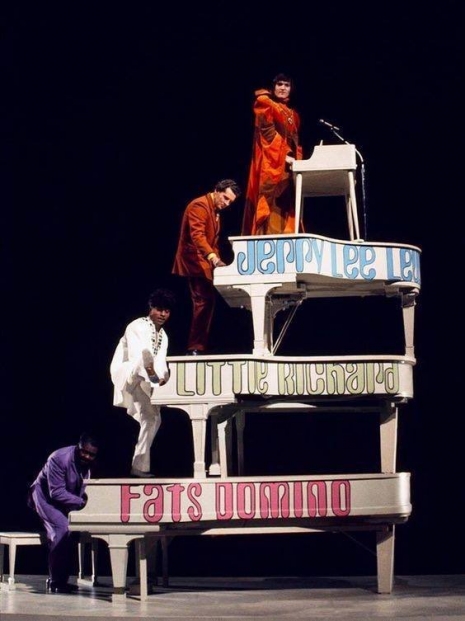
from Dangerous Minds:
After the glorious fiasco that was the 1968 movie Head, the last project that the Monkees undertook as a quartet was a TV special for NBC called 33⅓ Revolutions Per Monkee. It’s basically the TV equivalent of Head, complete with corny jokes, audacious cameos, hummable ditties, and stuff that makes you scratch your noggin in puzzlement.
Like the band itself, 33⅓ Revolutions Per Monkee, which aired on April 14, 1969, is thoroughly of the Sixties, somehow managing to blend (say) the Batman TV show and Barbarella with musical performance shows of the day like Shindig! (which makes sense, as the producer of Shindig!, Jack Good, was involved with this as well.
The Monkees enlisted Brian Auger and Julie Driscoll to take care of the half-baked framing narrative, a crazed musical impresario (errr, Don Kirshner?) who turns the four Monkees into mindless automatons so that he can “brainwash the world!!” (I told you it was right out of Batman.) The Monkees’ arrival is highly reminiscent of the “beaming” effect on Star Trek, which had been out for a couple of years by that point, so that counts as a reference.
About a third of the way through the show, Auger (still in “sinister” character) explains the nature of the musical mind-control properties of the rock and roll piano chords via an audacious device—the camera shows Auger at the piano and strategically pans away from the action to reveal that Auger’s piano is perched on a piano played by Jerry Lee Lewis, which is perched on a piano played by Little Richard, which is perched on a piano played by Fats Domino. Like this:

It was probably no accident that the band chose a metaphor of being controlled by a sinister puppet master. After all, the Monkees’ story is the most vivid example in rock history of a band struggling to seize the means of production (we call them “instruments”) from the corporate overlords that had conjured them into being in the first place—in the show, Auger actually uses the word conjure to summon them into being. Later on in the show, the four fellows sing a discordant little ditty called “Wind Up Man” (as wind-up men), which included lyrics like this:

It was probably no accident that the band chose a metaphor of being controlled by a sinister puppet master. After all, the Monkees’ story is the most vivid example in rock history of a band struggling to seize the means of production (we call them “instruments”) from the corporate overlords that had conjured them into being in the first place—in the show, Auger actually uses the word conjure to summon them into being. Later on in the show, the four fellows sing a discordant little ditty called “Wind Up Man” (as wind-up men), which included lyrics like this:
I’m a wind up man
Programmed to be entertaining
Turn the key
I’m a fully automatic
Wind up man
Invented by the teeny bopper
Turn me on
And I will sing a song about a
Wind up man
As mentioned, it would seem that the stress of being the world’s first purely manufactured rock and roll TV sensation had gotten to the boys…...
The show features a fair bit of material that never made it onto any of the Monkees’ record releases. The most interesting of them, by far, is a composition written and performed by Nesmith called “Naked Persimmon” that shows as vividly as possible in what direction Nesmith’s musical ambitions were headed, namely the country rock of the First National Band, which would be Nesmith’s post-Monkees solo project. In case you were in any way unclear that Nesmith was looking to fuse country and rock, “Naked Persimmon” will remove all doubt. It’s a kind of portmanteau song that required some TV editing magic to present properly, as it featured two Michael Nesmiths trading “rock” and “country” verses, each Nesmith duly mystified whenever the other’s verse intrudes on his own.
The end sequence of the show is every bit the everything and the kitchen sink Sixties freakout that you would devoutly wish for and expect.
As with Head, it must be said that 33⅓ Revolutions per Monkee was not a resounding success in commercial terms. NBC was so unenthusiastic about the special that it chose to run it against the Oscar ceremony. Then some engineer accidentally presented it out of sequence, thus ensuring that nobody in the home audience would be able to follow any of the show’s thematic hijinks. Peter Tork left the band right after the special, buying himself out of his contract and bringing the main period of Monkees to a definitive end.
I find almost all of it pleasurable on its own terms, though, and I’d recommend it in a heartbeat for that patented Monkee note of amiable mindfuckery. See it now.


























No comments:
Post a Comment